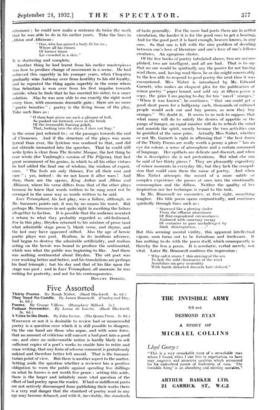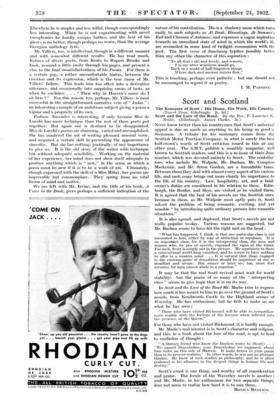Five Assorted
, .3s. 11.1.) A Voice in the Dusk. By John Irvine. (The Quota Press. 2s. 6d.)
WHETHER or not it is desirable to review bad or unsuccessful poetry is a question over which it is still possible to disagree. On the one hand are those who argue, and with some force, that no amount of criticism will convert a bad poet into a good one, and since an unfavourable notice is hardly likely to sell sufficient copies of a poet's works to enable him to retire and cease writing, that any form of adverse comment is gratuitously unkind and therefore better left unsaid. That is the humani- tarian point of view. But there is another aspect to the matter. Setting aside the question whether a reviewer has a positive obligation to warn the public against spending five shillings on what he knows is not worth five pence : setting this aside, there is the larger and infinitely more vital question of the effect of bad poetry upon the reader. If bad or indifferent poets are not actively discouraged from publishing their works there is a very real, danger that the standard of poetry read in any may ay become debased,,and with it, inevitably, the standards of taste generally. For the more bad poets there are in active circulation, the harder it is for the good ones to get a hearing. And for the good poet it is hard enough, heaven knows, in any case. So that one is left with the nice problem of deciding between one's love of literature and one's love of one's fellow. creatures. An egregious choice.
Of the five books of poetry tabulated above, two are accom- plished, two are intelligent, and all are bad. That is to say that no one would be spiritually any the poorer for not having read ,them, and, having read them, he or she might conceivably be the less able to respond to good poetry the next time it was encountered. Miss Nisbet is introduced by Mr. Edward Garnett, who makes an eloquent plea for the publication of minor poetry " paper bound, and sold say at fifteen pence a copy, the price I am paying to-day ter ten navel' oranges:: "When it was known", he continues, " that one could get a good short poem for a halfpenny each, thousands of cultured people would seek out and buy poems, as now they buy oranges." We doubt it. It seems to us rash to suppose that what many will do to satisfy the desires of appetite or the pangs of hunger, an equal number will do to refresh the mind and nourish the spirit, merely because the two activities can be gratified at the same price. Actually Miss Nisbet, whether or not Mr. Garnett is right in affirming that " the best dozen of the Thirty Poems are really worth a penny a piece " has an eye for colour, a sense of atmosphere and a certain command of language. Her epithets are delicate and discreet, and when she is descriptive she is not pretentious. But what else can be said of her thirty pieces ? They are pleasantly expository of minor moments in everyday life, but they lack the compul- sion that could earn them the name of poetry. And when Miss Nisbet attempts the record of a more subtle or complex experience she passes at once into the emotionally commonplace and the diffuse. Neither the quality of her inspiration nor her technique is equal to the task.
In Mr. Bramwell we encounter, at first sight, something tougher. His title poem opens enigmatically, and continues spiritedly through lines such as : Spawned like a glowing cinder From the effluent abundance Of flint-engendered circumstance, Endowed with cometary energy Of centuries to pass unchallenged by Dark disintegration, . . ."
But this seeming mental virility, this apparent intellectual vigour, soon turns out to be fortuitous and irrelevant. It has nothing to do with the poem itself, which consequently is thereby the less a poem. It is acrobatic, verbal merely, not vital. Later Mr. Bramwell confirms the impression :
" Why call it storm I this striving of the sea To lash the wild chromatics of the wind Annihilate sin-grey neutrality
With harsh distorted discords hate-defined."
Elsewhere he is simpler and less wilful, though correspondingly less interesting. When he is not experithenting with novel cacophonies he hardly escapes bathos, and the best of his pieces is no better, though perhaps no worse, than the average Georgian anthology lyric.
Mr. Villiers, too, is intellectual, though in a different manner and with somewhat different results. He has read much. Echoes of divers poets, from Keats to Rupert Brooke and back, resound a little easily through his pages, and present a clue to the final unsatisfactoriness of his Poems. For there is a certain gap, a rather uncomfortable hiatus, between the emotion and its expression, which is the true cause of Mr. Villiers' failure. This leads him too often into a derivative utterance, and occasionally into surprising errors of taste, as when he exclaims . . . " Then why in Heaven's name do I sit here ?" For this reason too, perhaps, Mr. Villiers is most successful in the straightforward narrative vein of " Judas " : an interesting example of an ambitious subject giving a poem a vigour and a propriety of its own.
Paduan November is interesting, if only because Miss de Lucebi has more technique than the rest of these poets put together. But again one is destined to be disappointed. Miss do Lucchi's poems are charming, varied and accomplished. She has mastered the art of writing pleasant musical verse, and acquired a certain skill in presenting the appearance of sincerity. But she has nothing, poetically, of any importance to give us. It is the old story of the writer with technique but without adequate sensibility. Working on the material of her experience, her mind does not show itself adequate to produce anything which is " new," in the sense in which a poem must be new if it is to be a work of art. Ultimately, though expressed with the skill of a Miss Millay, her poems are impeccable but commonplace. They spring from no vital fusion of mind and matter.
We arc left with Mr. Irvine, and the title of his book, A Foice in the Dusk, gives perhaps a sufficient indication of the nature of his contribution. His is a shadowy muse which turns easily to such subjects as At Dusk, Hauntings, At Summer's End and Chamois" d'Automne, and expresses a vague aspiration towards an unrealized state of mind in which the world's ills are reconciled in some kind of twilight communion with the past. The first verse of Sanctuary typifies possibly better than any other the character of this aspiration :
" To all that's old and lovely, and remote, I in my utter weariness would go, Back to a world of half-forgotten things Where dark and ancient waters flow."
This is touching, perhaps even pathetic : but one should not
be encouraged to regard it as poetry.
I. 'M. PARSONS.































 Previous page
Previous page